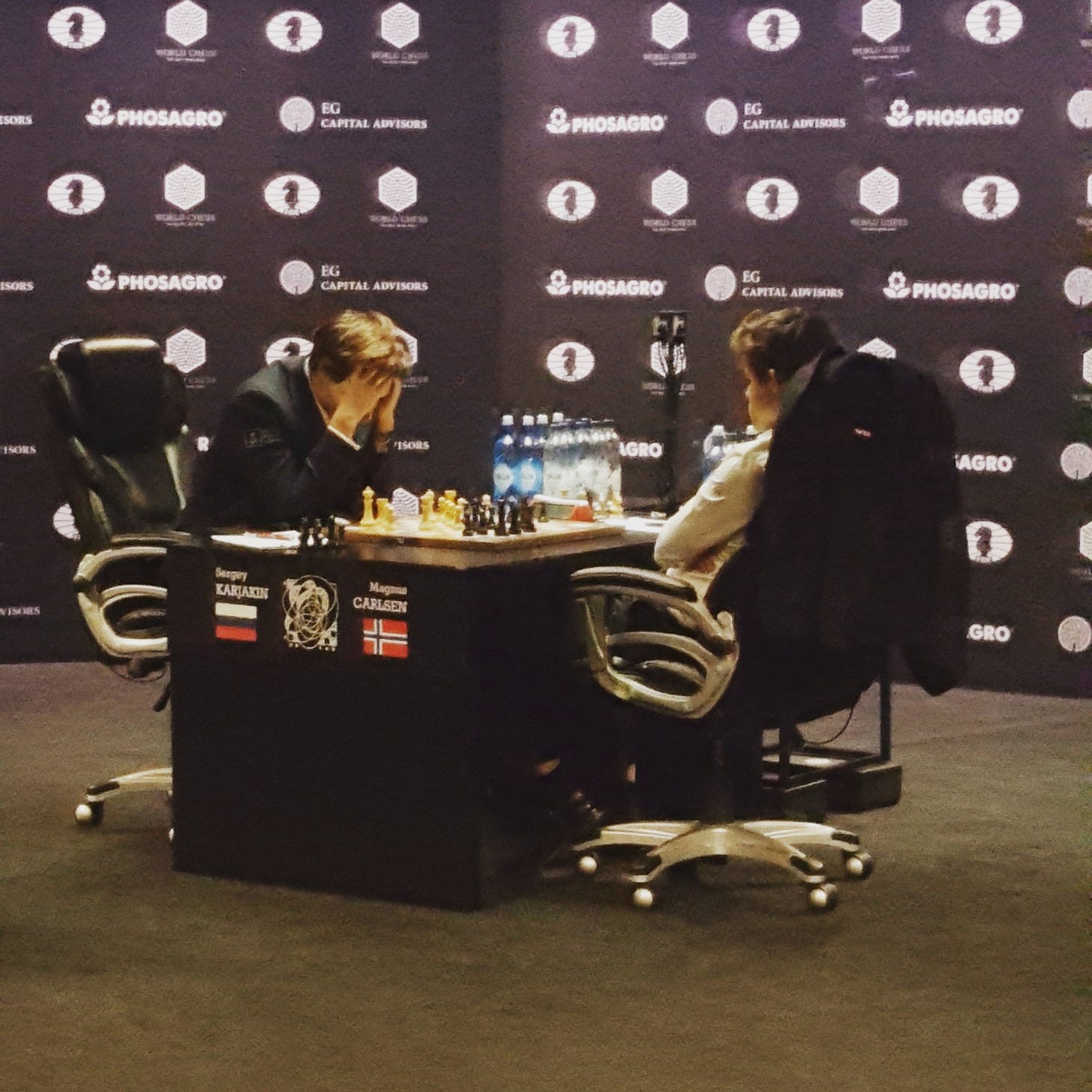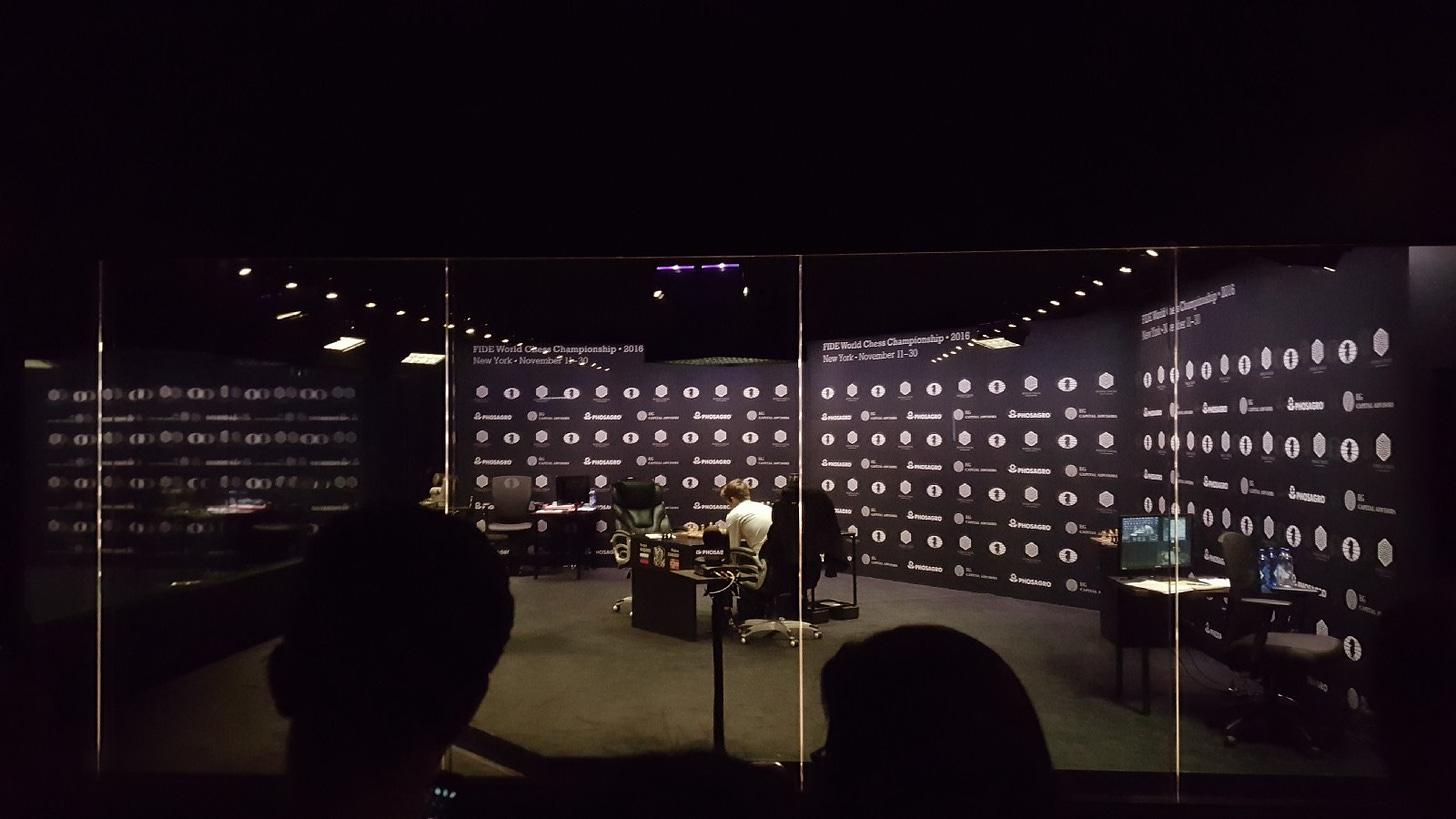A Winning Sacrifice

Thinking
Over the last few weeks, two young men waged a fierce mental battle against each other in Manhattan’s South Street Seaport, seeking the title of World Chess Champion. They played twelve grueling rounds of classical chess, with most games lasting seven hours or more. When those twelve games ended in a 6–6 tie, they engaged in a sudden-death overtime: A round of four games where each player had 25 minutes to make all of his moves, plus ten extra seconds for every move they made. I attended one of the full-length games — the eleventh, which was a draw — and the sudden-death rapid match, which was nerve-racking and exhilarating.
My personal interest in chess started in high school, when I was part of the chess team. As a nerdy adolescent, I was fascinated by all sorts of games — roleplaying games like Dungeons & Dragons, as well as Go, the Japanese alternative to chess which is, if anything, more brain-twisting. In my mid-twenties, I worked as an editor at a celebrity magazine, interviewing Hollywood stars and writing pieces on shoe designers. As an antidote to this submersion in superficiality, I joined the Marshall Chess Club — a legendary center for the game, an old West Village brownstone where past champions studied and fought — and played in weekend tournaments. Each game would last for four or five hours, unless some blunder brought it to a brutal, sudden end.
One day, I left chess behind and barely touched it for the next decades. Although I wasn’t particularly talented at it, I recognized the game had the eerie ability to invade my mental space, like some strange colonizing power. It may have been Lenin who said that chess is too frivolous for a life and too serious for a game — if he did say that, kudos to him. When you choose to focus on improving your chess game, you discover an entire regimen of mental gymnastics that needs to be practiced, much like physical exercises or learning to play an instrument or a language. These include studying the theory and practice of openings, middle and end games, pawn structures, combinations, tactics, positional strategies, and so on — all of this so you can achieve the meaningless satisfaction of defeating another person by annihilating their defenses and turning over their king.
Chess has a peculiar poetic force, with the various openings each possessing their own distinct psychological character, depending on whether they are open or closed, positional or tactical. It is unsurprising that it served as a useful symbol for many of the greatest artists of the last century — for instance, Marcel Duchamp played chess against a naked woman as part of a DaDaist performance, and in Ingmar Bergman’s The Seventh Seal, the protagonist plays a chess match against death for the fate of his soul. The game has an inexorable quality to it — a sterile mathematical perfection — that is reminiscent of time, death, fate, certain forms of madness, and entropy.
Different chess genuises have particular styles and tendencies. Magnus Carlsen — the 26 year old Norwegian who successfully defended his title against his Russian opponent, Sergey Karjakin, in New York this week — plays with patience and lucidity. He often exploits what seem at first to be minuscule advantages that eventually lead to him squeezing the life out of his opponent’s position. When I was last into chess, the reigning world champion was Gary Kasparov, a swashbuckling attacker who seemed to have a magical facility to find tactical combinations in seemingly dour positions and who once characterized the game as “mental torture.” Karjakin — also 26, he was the youngest grandmaster in the world, garnering that title at the age of 12 — seemed to relish the role of stubborn defender in his games against Carlsen. Instead of pushing to win, Karjakin’s strategy was to create drawish positions and hope Carlsen would overreach in his efforts to beat him. In this way, Karjakin was the first to win a game in the match after drawing seven games. Carlsen equalized in the 10th game, forcing the tiebreakers.
Personally, I found it an odd coincidence that this match was taking place now in New York. After avoiding chess for many years, I found myself pulled back into its vortex just a few weeks before the US Presidential election last month. A few friends had started to play and I was introduced to chess.com — an online platform and mobile application that matches you with chess players from all around the world for immediate, rapid games. In retrospect, I think I was looking for a way to tune out and avoid the hoopla surrounding the presidential race. Even though Clinton was favored to win, I had a sneaking suspicion it was going to go Trump’s way in the end — I suspected people were too ashamed to tell the pollsters they were going to vote for him. As an iconic embodiment of the United States in all of its hubris, shallowness, and glitz, Trump seemed a shoo in. When he won, I found myself shocked and disoriented, but not surprised.
Perhaps it is too much to venture the metaphor, but, with Trump’s election, I can’t avoid the sneaking, slightly nauseating feeling that our postmodern civilization, locked in binary logic and outmoded two-party systems, has checkmated itself. We have reached the end of something, and nobody knows what comes next — a descent into tyranny, ecological meltdown, an evolutionary upsurge into something as of yet unknown, or all of the above? If I allow myself to belabor the metaphor, I find it intriguing that just as we have reached the end of this present political system, we have also, in a sense, reached the end of chess, the “royal game” which tells, again and again, the old story of a war between two kingdoms. We have reached the end of chess, because the computers are now better at it than we are — better, even, than the greatest human players. Chess continues, now, as a sport — and is even gaining popularity — but it is no longer an uncharted wilderness of possibility, an unknown country.

The players fought it out inside of a soundproof booth.
During the second tiebreak rapid game, Carlsen sacrificed a pawn and figured out a beautiful maneuver to gain the upper hand, reaching the winning advantage of two bishops against a rook. With only a few minutes to play on the board, the World Champion sought the winning line. The computer analyzing the game drily announced checkmate in 31 moves. Poor human Carlsen missed the win as Karjakin found an almost incredible stalemate. But the effort seemed to exhaust the challenger, who collapsed quickly in game three. The loss meant he had to find a win, with the black pieces, in the final rapid game or lose the match. He pressed with the Sicilian Defense, but Carlsen smashed him apart, ending the game with an elegant queen sacrifice that seemed to satisfy something deep in the assembled crowd who roared their applause. We yearn for a perfect, clear resolution in this increasingly ambiguous, murky world. For one moment — on the chessboard at least — Carlsen found it.




